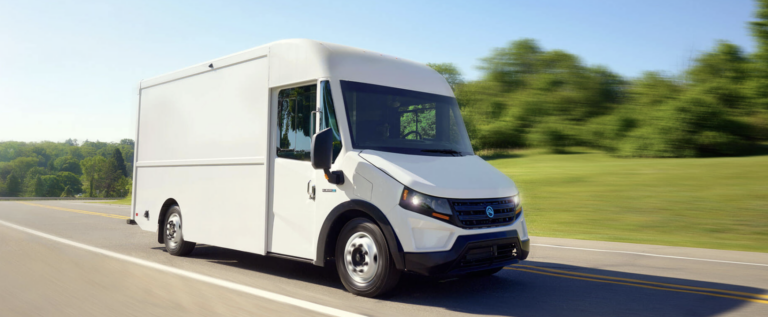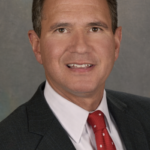
- Kim Kisner
- Business
- 12/17/2024
A Q&A with The Shyft Group

Sustainability is a key focus in transportation, and commercial electric vehicles (EVs) come with their own set of challenges and opportunities. From extending EV range to tackling infrastructure and regulatory issues, progress demands both innovation and collaboration. The Shyft Group, a Novi, Michigan-based manufacturer of specialty vehicles, has been working to align its operations and product development with sustainability goals.
SBN Detroit interviewed Josh Sherbin, chief legal, administrative, and compliance officer, to discuss the company’s approach to sustainability, the challenges of EV adoption in the commercial sector, and the broader implications for the transportation industry. (Note: On Dec. 16, 2024, after this interview was conducted, Shyft announced that it plans to merge with Switzerland-based Aebi Schmidt Group. The transaction is expected to close by mid-2025.)

Q: How does the Shyft Group approach sustainability in product development strategies?
A: Sustainability is integrated into all aspects of our product development. This reflects our commitment to environmental stewardship while meeting customer demands for efficient and responsible solutions.
Our Blue Arc Class 4 EV truck, developed over the past three years, exemplifies our commitment to sustainability. Throughout its development, we’ve collaborated across the company to align operational priorities with environmental priorities. The results in a purpose-built, zero-emissions solution designed to address the specific needs of our commercial customers.
Q: Blue Arc has achieved a range of greater than 200 miles between charges. What technological advancements have contributed to this milestone?
A: Key advancements include regenerative braking, which recaptures energy to extend range; lightweight construction using aluminum for the cabin and shelving; and fast-charging capabilities that allow charging times of just two to six hours. These features were refined through extensive real-world testing to ensure reliability, environmental responsibility, and performance under demanding conditions.
Q: Many commercial EVs have a range of around 160 miles. What are the challenges in extending EV range, particularly for commercial vehicles?
A: Achieving greater range requires balancing several factors. For example, we need to optimize battery weight without compromising payload capacity. Efficiency under adverse operating conditions, such as extreme weather or rough roads, is another key consideration. We’ve worked to enhance range without sacrificing performance or customer needs.
Q: What are some broader industry challenges in the commercial EV sector?
A: The commercial EV sector is advancing rapidly, with last-mile delivery emerging as a practical application due to predictable routes and centralized charging. However, challenges remain. Expanding a reliable charging network is crucial for fleet operations, as the current infrastructure does not fully meet high-capacity needs.
Upfront EV costs can pose challenges for smaller operators, despite potential long-term savings in fuel and maintenance. Additionally, sourcing sustainable materials for batteries and ensuring vehicles meet rigorous safety and performance standards add complexity to design and development. These challenges are being addressed through ongoing innovation and collaboration across the industry.
Q: Are there regulatory, technological, or infrastructural barriers that still need to be addressed?
A: Regulatory frameworks need to continue to evolve to better support the adoption of commercial EVs. Technological advancements in battery performance, including faster charging and cost reductions, are also critical to improving fleet efficiency and reducing downtime.
Infrastructure remains a key focus, with a need for high-capacity chargers and strategically placed stations along logistics routes. Lastly, workforce training and development are essential to support the transition to EVs. Technicians require specialized skills to maintain and repair electric drivetrains and battery systems, while operators benefit from education on optimizing fleet efficiency.
With continued collaboration between manufacturers, policymakers, and infrastructure providers, along with investments in workforce development, these barriers can be addressed, enabling a smoother transition to zero-emission commercial fleets.
Q: How are material recycling and recovery implemented across your manufacturing processes?
A: Recycling and recovery are core elements of our approach to sustainability, and these efforts reflect the dedication of our teams across the company.
In 2023, 74% of our products were recyclable, and 59% incorporated recycled or remanufactured materials. We also leverage advanced technologies like laser fabrication machines and water recirculation systems to conserve resources.
Other measures include high-efficiency LED lighting, paint booths designed for minimal energy use, and speed doors that help conserve heat. These practices are part of our broader mission to reduce our environmental impact while fostering clean, safe work environments.
Q: Do you have any specific partnerships or collaborations in Southeast Michigan that have been instrumental in reaching sustainability goals?
A: Collaboration is central to our approach. Internally, our Shyft for Good initiative supports environmental stewardship and community engagement. We partner with organizations like Habitat for Humanity and the Manufacturing Institute to foster community development and talent pipelines.
Locally, we collaborate with the Lansing Economic Area Partnership to promote sustainable business development in the region. These efforts align with our mission to create positive environmental and social impacts while advancing sustainability.
Q: Looking ahead, what are the next steps for the Shyft Group in terms of sustainability and innovation?
A: We’re focused on continuing to reduce our environmental footprint through energy-efficient processes, expanded recycling programs, and reductions in waste and water use across manufacturing operations.
Our “One” Shyft mindset reminds us that our greatest strength lies in our people. By working as one team, sharing best practices, and fostering collaboration across teams and brands, we deliver sustainable solutions that meet customer needs while driving progress for the broader industry. Together, with our customers and partners, we’re advancing zero-emission commercial fleet options, and contributing to meaningful change in transportation.
Be sure to subscribe to our newsletter for regular updates on sustainable business practices in and around Detroit.
Kim Kisner
- All
- Business
- Community
- Education
- Events

Unique Monique Scented Candles, a Detroit-based business founded by Monique Bounds., aims to produce candles and household products with clean ingredients and local supply chains. What began as a personal hobby during college has evolved into a full-time venture producing coconut oil and soy-based candles made with essential oils and locally sourced materials. SBN Detroit interviewed Bounds about launching a sustainable product line, sourcing challenges in Michigan, and...

Eastern Market Partnership, in collaboration with the City of Detroit’s Office of Sustainability Urban Agriculture Division, has announced $240,000 in grant funding to support Detroit-based farmers and farmer collectives. The grants will advance food access, climate education, sustainable land use, and economic opportunity, with priority given to Black- and Indigenous-led farms, youth-led initiatives, and projects rooted in historically disinvested neighborhoods. The recipients – ranging from cooperatives and community...

Citizen Robotics is a Detroit-based nonprofit that advances the use of robotics and digital manufacturing in residential construction, focusing on improving productivity, sustainability, and long-term affordability. Best known for its early work in 3D-printed housing, it explores how alternative construction methods and new financial models can reduce material waste, lower lifetime operating costs, and enhance the resilience of homes. SBN Detroit interviewed Tom Woodman, founder and president of...







